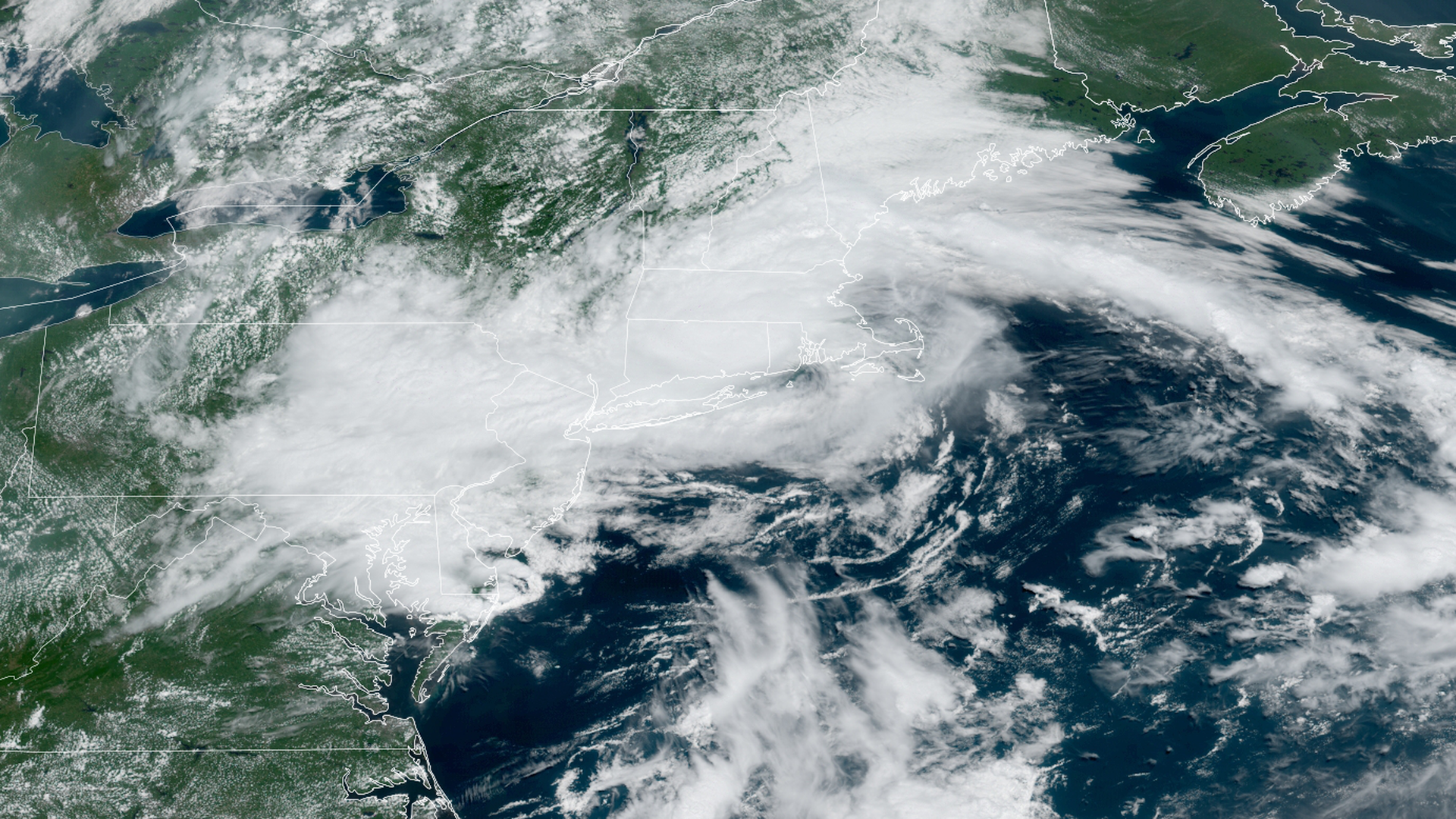Tropical Storm Henri makes landfall in Rhode Island
Add Axios as your preferred source to
see more of our stories on Google.

Satellite image shows Henri making landfall in Rhode Island. Photo: CIRA/RAMMB
Tropical Storm Henri made landfall in Rhode Island on Sunday afternoon, bringing damaging winds, storm surge flooding and torrential rainfall, according to the National Hurricane Center.
The latest: Speaking from the White House later Sunday, President Biden said the administration has been monitoring the storm's movements and making preparations for recovery efforts. "This storm has the potential for widespread consequences across the region," Biden said
- The Federal Emergency Management Agency has resources ready in the region to respond to the storm, including food, water, communications equipment, and generators, Biden said.
- Thousands of crew members from other states and Canada are on their way to help clean up the damage and restore damaged power lines, he added.
- Biden said he has already approved emergency declarations for Rhode Island, Connecticut and New York and reminded people to continue being mindful of COVID-19 precautions.
- "To everyone across the country: Don't get caught by the next storm, get vaccinated, get vaccinated now," he said. "Protect yourself and your family against COVID-19. It's going to be a vital part of emergency preparedness this year."
The big picture: The storm has slowed down slightly but maximum sustained winds in Rhode Island reached 60 mph at the time of landfall, according to the NHC.
- The storm has left more than 125,000 homes from New Jersey to Maine without power and disrupted air and rail travel, the New York Times reports.
- Several counties in Rhode Island have already received more than 2 inches of rain and flash flood warnings have been issued in several Massachusetts counties. Flash floods have also been reported in New York and New Jersey.
- The storm had been weakening slightly as it approached the coast due to cooler waters just offshore. It is forecast to move north-northwest and slow to a near crawl into Sunday night.
- Tropical storm-force winds with higher gusts have moved onshore and will keep pushing inland throughout the day. Some areas may see a six-hour or more period of damaging winds that, given recent rains, are likely to take down trees and power lines.
- Tropical storm and storm surge warnings span the length of the southern New England coast as the storm's 125-mile diameter tropical storm wind swatch pushes water toward the coast.
A storm surge of 3 to 5 feet above normally dry ground is anticipated along the south coast, including Long Island's south and north shores, coastal Connecticut, Rhode Island, Cape Cod and the Islands. Nearly 20-foot waves have been observed just off the coast.
- This would not be a record surge but is comparable to other events in the past that caused damage.
- The National Weather Service forecast office in New York City called the surge threat "major" life-threatening for its forecast area.
The storm's other biggest risk is heavy inland rains, with a widespread 3 to 6 inches of rain likely to fall from northeast Pennsylvania to New England. Some spots may pick up 10 inches or more, and Henri-related flash flooding is already underway in northern New Jersey.
- Five to six inches of rain has already fallen in parts of Connecticut, New York City and New Jersey.
- The authoritative climate science report released this month by the UN Intergovernmental Panel on Climate Change found that extreme precipitation events, including heavy downpours, are becoming more frequent and severe, and that tropical storms and hurricanes are producing heavier rainfall in a warming world.
The bottom line: Typically, inland flooding, rather than strong winds, is the greatest threat to lives and property out of a tropical storm or hurricane's arsenal.
- "Heavy rainfall from Henri may result in considerable flash, urban and small stream flooding, along with the potential for widespread minor to isolated moderate river flooding," the National Hurricane Center warned.
Editor's note: This is a developing story. Check back for updates.
